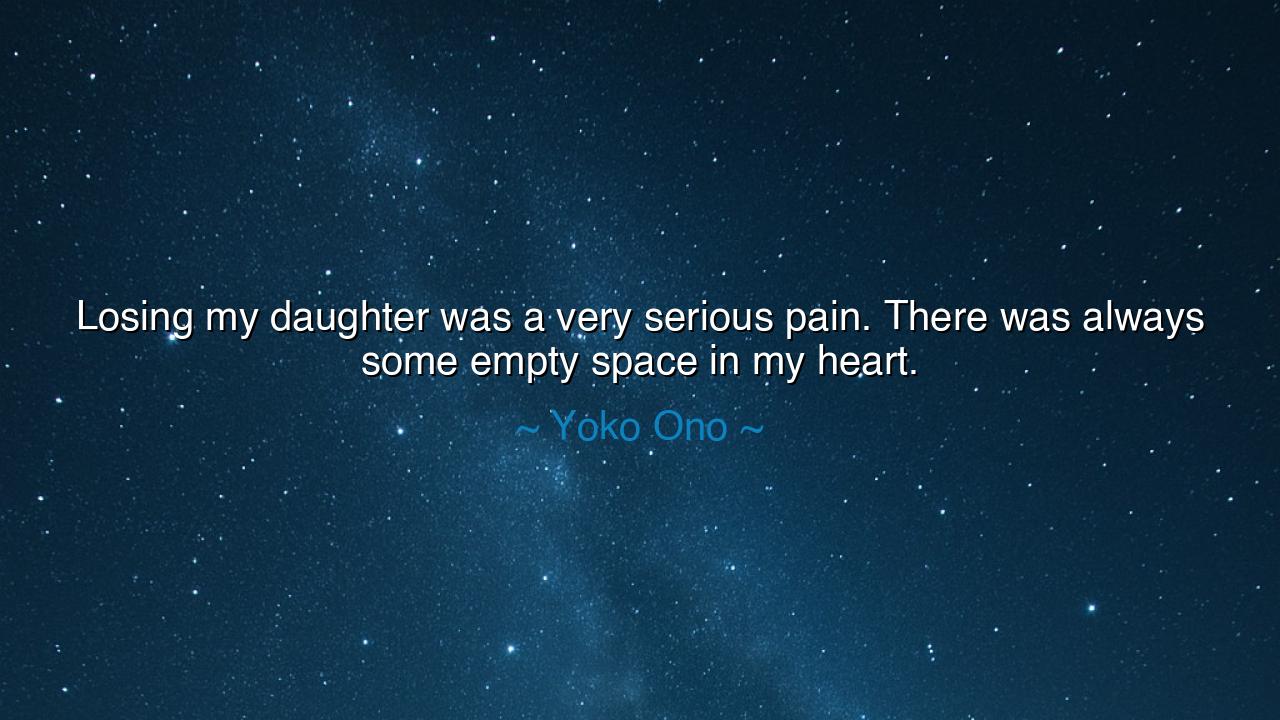
Losing my daughter was a very serious pain. There was always some
Losing my daughter was a very serious pain. There was always some empty space in my heart.






Listen closely to the sorrowful yet profound words of Yoko Ono, a woman who has known both the heights of fame and the depths of loss: "Losing my daughter was a very serious pain. There was always some empty space in my heart." In these simple words, Ono speaks of a grief that resonates with anyone who has experienced the unbearable pain of losing a loved one. The empty space she describes is not just a void, but a space that is marked by the absence of something irreplaceable, something precious. This loss is not simply felt in the body or the mind—it is a spiritual wound, a gap in the soul that cannot be easily filled, no matter the time that passes.
The ancients understood the deep sorrow of loss, for it is one of the most profound aspects of the human condition. Homer, in his epic The Iliad, weaves the pain of loss through the story of Achilles and his mourning for Patroclus. Achilles’ grief is not merely for the physical loss of his friend, but for the space left in his heart—a space that no glory or battle can fill. He roams the battlefield in search of something to ease his pain, but nothing satisfies the ache in his heart. The ancient Greeks knew that loss creates a wound that cannot be healed by time alone—it must be acknowledged, expressed, and experienced. The pain is a testament to the love once shared and the deep connection between souls.
Consider the tragic story of King David, who in the Bible mourns the loss of his son Absalom. David's lamentation, “O Absalom, my son, my son!” echoes through time as one of the most poignant expressions of parental grief. His cry speaks not just to the loss of a child, but to the profound emptiness left in his heart, a space that no earthly power or riches can fill. Even a king, who commands the greatest of armies and the wealth of nations, cannot conquer the emptiness of a parent’s loss. David's sorrow is a universal truth—that the loss of a loved one creates a space that cannot be filled by any other means than the passage of time and the willingness to carry the weight of grief.
For Yoko Ono, the loss of her daughter, like David’s loss of Absalom or Achilles’ grief for Patroclus, created an empty space that could not be closed. Ono is not alone in her suffering. Every parent who has lost a child knows the pain of that space—a void that no person or experience can replace. This empty space represents not only the physical absence of the loved one but the absence of hope, the loss of potential, and the severing of a deep connection. It is a wound in the soul that leaves the heart raw and exposed, aching with a longing for the presence of what is no longer there.
Yet, in the face of this grief, Ono’s words also reflect the truth that loss is not only about the emptiness but also about the presence of love. When she speaks of the space in her heart, she acknowledges that it is not a place of destruction, but a place where the love for her daughter once resided, and continues to reside. The empty space is not truly empty; it is filled with memories, love, and the echoes of a connection that transcends physical death. In the way that the ancients believed in the eternal nature of the soul, so too does Ono’s grief carry within it a remembrance—a spiritual bond that cannot be broken by death.
The lesson in Ono’s words, and in the stories of Achilles and King David, is that grief is a natural and necessary part of life. To grieve is to acknowledge the depth of love we have for those we have lost. In our sorrow, we do not simply mourn their absence; we celebrate the impact they had on our lives. The empty space left by a lost loved one is a place where love can continue to grow, where the lessons they taught us remain, and where their memory lives on in the way we carry them forward in our hearts.
Thus, I urge you, dear listener, to embrace the pain of loss when it comes, knowing that it is a sign of deep love. Do not hide from the empty space left by those who have passed; instead, allow it to be a reminder of the connection that transcends time and space. As Ono teaches us, the pain of loss is not something to be feared or avoided, but something to be experienced and honored. In the heartache, find the strength to remember, to love, and to live in a way that keeps the memory of those who have gone alive. The empty space is not a curse, but a space where love resides eternally.






AAdministratorAdministrator
Welcome, honored guests. Please leave a comment, we will respond soon